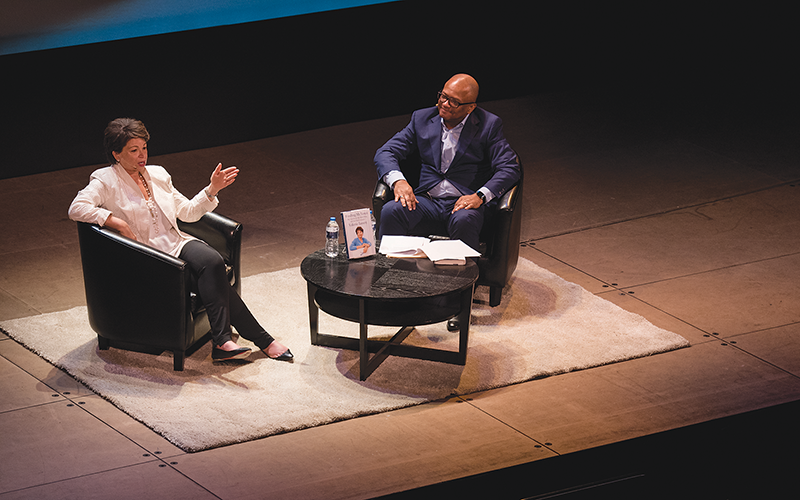While a student at U-M’s Law School, Valerie Jarrett, JD’81, did not spend time cheering on the Wolverines at the Big House. “I went to my first football game, and it was really cold outside,” she confided during an interview, “so I never went to another.”
Instead, she focused solely on her academics, knowing the stakes were high for an African American woman. She made that realization while pursuing her undergraduate degree at Stanford University. “The fact that generation after generation of my family had overcome enormous obstacles to succeed, and my parents had made sacrifices so I could have the opportunity to be on that campus, was never far from my mind,” she writes in her new memoir, “Finding My Voice: My Journey to the West Wing and the Path Forward.”
Jarrett, the longest-serving adviser in the Obama administration and a close friend of the former president and his wife, was in Ann Arbor April 22 to promote her first book. She spent two hours at the Michigan Theater discussing her memoir and taking questions from U-M adjunct professor Broderick Johnson, JD’83, who worked for three years alongside Jarrett as the White House cabinet secretary. The two also worked together on Obama’s senate and presidential campaigns.
“I’m really proud you are a Michigan Wolverine like I am,” Johnson noted, before complimenting Jarrett on the way she has managed her career. “Opportunity is not enough. If you’re the only person of color, you wonder if anyone is listening,” he said.

As the title of her book implies, being heard is important to Jarrett. Though her African American family was one of Chicago’s most distinguished—her grandfather Robert Taylor was the first black chairman of the Chicago Housing Authority—her parents still encountered prejudice that restricted their opportunities.
Her father, Jim Bowman, was a physician, yet few hospitals in 1950s Chicago would hire him. So he accepted a position at the Nemazee Hospital in Shiraz, Iran, where Jarrett was born in 1956. As his research into inherited-blood diseases took off, Jarrett traveled with her parents across Europe, Russia, Africa, and the United States.
“My mom and dad had taken me across the color line and around the world, showing me what was possible, so that I could dare to imagine any kind of life I wanted,” she writes. “It was only years later that I truly understood how lucky I was.”
They returned to Chicago in 1961, where, Jarrett said, she was immediately bullied. She was fair skinned, freckled, and spoke with a British accent, and her stellar foreign education resulted in her placement in a class with students two years older than herself. Jarrett stopped speaking French and Farsi, insisted on speaking only English, and tried to figure out why her black classmates were so mean to her.
“If this is supposed to be my community,’ I wondered, ‘why am I treated poorly?’” she writes.
She blossomed, however, once her parents put her in private schools. And at Stanford, she found a supportive cohort of classmates. Her arrival at the U-M Law School was the next phase of an ambitious 10-year plan she devised in her 20s. Beyond Stanford and U-M, it included discovering her career passion, and marrying and having children by the age of 30.
It was all going to schedule until she left Ann Arbor. Two stints in Chicago law firms proved to Jarrett that private practice was not for her. Her 1983 marriage to William Robert Jarrett was short lived but produced a daughter, Laura, who is now a lawyer and CNN Department of Justice correspondent.
Despite veering off course, Jarrett said she does not regret working in law firms. “If I hadn’t been as miserable, I might not have had the courage to leave, so I’m kind of glad I was really unhappy because things do lead to other things.”
In her case, it led to a 1987 administrative job for Harold Washington, Chicago’s first black mayor, and a challenging career in public service. Working as deputy chief of staff to Mayor Richard M. Daley, she was constantly confronted by angry Chicagoans with nowhere else to turn.
“The principal quality that my job required was an unwavering air of calm, no matter how heated the conversation became,” Jarrett writes
She also learned to shake off the shyness that had long plagued her. “I think in the beginning, I didn’t have the confidence to listen to the most important voice, and that’s the quiet one inside of me,” she said during the interview.
Working with Chicagoans, Jarrett writes she discovered “not only how to trust my own voice and act on what it was telling me, but also how to use my voice to advocate for change and progress for the city that I loved.”
In the West Wing, Jarrett also advocated. At the Michigan Theater, she shared an issue that arose involving women on the White House staff. When she learned they felt overlooked during male-dominated meetings, she spoke with the president. He then invited them to the White House for a dinner. At the end of the meal, the president asked each woman if she had felt heard or had anything else to add. When each said she was satisfied, Obama told them he couldn’t afford to have them be silent in the future. After that, Jarrett said, the women participated more in meetings.
Not surprisingly, current Democratic presidential candidates have reached out to Jarrett, who counsels them to be authentic and to focus on things that will bring the country together rather than divide it.
Though no longer in the West Wing, she has remained busy with projects beyond the book. She is working with Michelle Obama on a voter registration initiative, sits on the board of the Kennedy Center, is an adviser to the Obama Foundation, and recently joined the faculty of the University of Chicago Law School. This summer, she will also become a grandmother. Or, as she said, “My life is full.”
Micheline Maynard, a Knight Wallace Fellow in 1999-2000, is a regular contributor to Michigan Alumnus.





